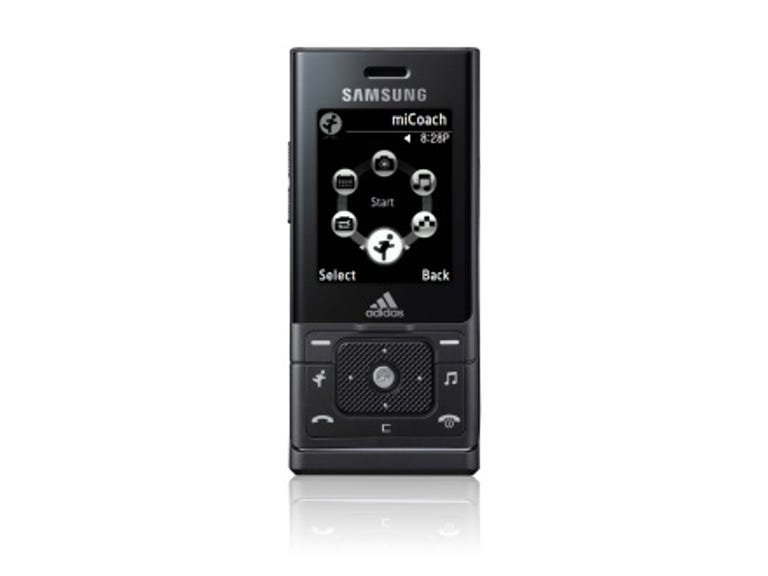 Why You Can Trust CNET
Why You Can Trust CNET Samsung Adidas miCoach F110 review: Samsung Adidas miCoach F110
Are you lacking motivation in your workout routine? This handset from Samsung and Adidas may provide just the kick start you need. The miCoach F110 helps you set training goals and measures your fitness with a pedometer and heart rate monitor. Don't worry, it does well as a phone, too
Do you need extra motivation to do up the laces on your trainers and head out to pound the pavement? This tie-up between Samsung and Adidas may provide just the kick start you need.
The Good
The Bad
The Bottom Line
The miCoach F100 is a phone like no other. Inside it lurks your very own personal trainer -- or the voice of one, at least -- ready to dish out advice on when to pick up your pace or back off before you give yourself a heart attack. The handset is available for free on most contracts, but is it good enough to take on the role of Mr Motivator?
Strengths
There have been plenty of previous attempts at creating an electronic coaching assistant. Perhaps the most high profile is the Nike+ partnership between Apple and Nike. Whereas that system simply uses a pedometer to track your pace, Samsung has gone much further with the F110.

In the box you get the phone, pedometer -- or Stride Sensor in Samsung speak, heart rate monitor and a USB lead for hooking the handset up to your PC or laptop. To set up your training regime you register on the miCoach Web site and select a training goal, ranging from the Learning to Run option for beginners to the Improve Performance for marathon-level runners. Cleverly, the Web site then creates a full programme of workouts that you synchronise over USB with your phone and that are designed to gradually improve your fitness over time.
When you're ready to start training, you simply hook the pedometer onto your trainer's laces and strap the heart rate monitor around your ribcage. The pedometer and heart rate monitor connect to the phone via Bluetooth so there aren't any awkward wires to set up. Hit the dedicated miCoach button on the handset and the phone starts up your first workout.
As you run, the handset monitors both your pace via the pedometer and your heart rate via the chest sensor. It gives you voice instructions through the supplied headphones on your running pace during different stages of the workout. For example, you usually start off slowly before being told to pick up your pace to move into a different power zone. You might then be told to slow down again for a few minutes before being asked to move up to a slightly faster clip for a set period of time.
While you're running you can tap the phone twice to hear an instant voice update on the workout. The phone's display also shows real-time data such as time, heart rate, distance, speed and calories burned. When you've finished your workout, you sync it with the miCoach Web site to view the stats for your run.
We found that the personalised workouts and vocal instructions were a real help as they give us a structured way to gradually improve our fitness levels. Rather than simply going for a run, you really feel like you're being helped to train in a more professional way. Being able to view graphs of your workouts keeps you motivated to stick with your personalised training regime. It's certainly a big improvement over previous digital training systems we've used.
You might've forgotten that this handset also makes phone calls. The F110 is good rather than outstanding. It's relatively small and light, and the slider action feels smooth and solid. The menu system is also easy to use and day-to-day tasks like texting are a breeze. The 2-megapixel camera takes decent shots, but unfortunately it lacks a flash for low light shooting. Call quality is good and you'll get around two and a half hours of talk time from the battery.
Weaknesses
The biggest issue we have with the F110 is
that it's a phone. That may sound weird, but think about it: do you
really want to go running with your phone? Apart from training to get
fit or losing weight, one of the reasons most people go running is to
get away from it all. With the F100 you're never really free: someone
could call you, interrupt your rhythm. What are they going to think
when you answer the phone completely out of breath because you've just
been pushing hard into your Power Zone?
There are some other niggles, too. On a few occasions we went for a run, got home and synchronised the running data only to find that the pedometer hadn't been registering our foot falls. The result is a bunch of pretty useless heart rate data with no distance data to put it in context. Surely Samsung could have programmed the phone to know that when it's registering a higher heart rate but no strides, something is wrong with the pedometer. You could then get a notification so you can reposition the device on your running shoe.
Conclusion
We're not completely convinced that a
mobile is the best training partner and we'd love to see Samsung offer
an MP3 player with similar technology. For now the F110's miCoach
training system is way ahead of competitors like the Nike+. Add in the
fact that the F110 is also a pretty decent handset and you've got a
winning combination.
Edited by Jason Jenkins
Additional editing by Shannon Doubleday
